

Cubs Related: Are the Chicago Cubs the Most Mentally Fit Team? 49 Phrases to Calm an Anxious Child. It happens to every child in one form or another – anxiety.
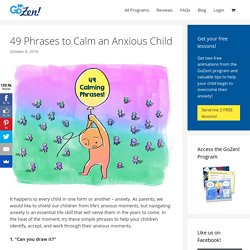
Psychologists recommend children be bored in the summer — Quartz. Do you entertain your kids with chess camp, art school, cooking classes, or tennis lessons during the unstructured summer months?
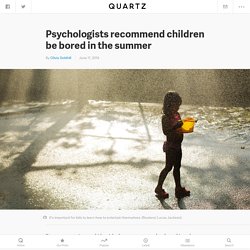
Alternative Medicine Gurus Are Misleading Cancer Patients - Integrative Oncol... Neurobiological Changes Explain How Mindfulness Meditation Improves Health-CMU News. Thursday, February 4, 2016 Over the past decade, mindfulness meditation has been shown to improve a broad range of health and disease outcomes, such as slowing HIV progression and improving healthy aging.
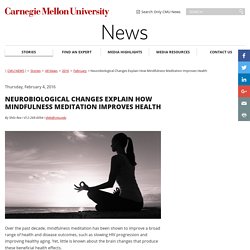
Yet, little is known about the brain changes that produce these beneficial health effects. New research from Carnegie Mellon University provides a window into the brain changes that link mindfulness meditation training with health in stressed adults. Published in Biological Psychiatry, the study shows that mindfulness meditation training, compared to relaxation training, reduces Interleukin-6, an inflammatory health biomarker, in high-stress, unemployed adults.
The biological health-related benefits occur because mindfulness meditation training fundamentally alters brain network functional connectivity patterns and the brain changes statistically explain the improvements in inflammation. View as a webpage. To live is to pursue goals.
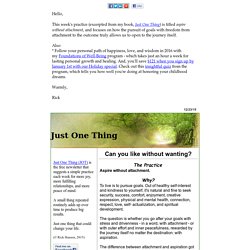
Out of healthy self-interest and kindness to yourself, it's natural and fine to seek security, success, comfort, enjoyment, creative expression, physical and mental health, connection, respect, love, self- actualization, and spiritual development. The question is whether you go after your goals with stress and drivenness - in a word, with attachment - or with outer effort and inner peacefulness, rewarded by the journey itself no matter the destination: with aspiration. The difference between attachment and aspiration got really clear for me one time in Boulder, Colorado, where I'd gone with my old friend Bob for a week of rock climbing. View as a webpage. FDA just approved a ‘cooling cap’ to reduce hair loss during chemotherapy. (Courtesy of Dignitana) The Food and Drug Administration on Tuesday approved the nation's first "cooling cap" intended to reduce hair loss in female breast cancer patients undergoing chemotherapy.

The DigniCap Cooling System, manufactured by Sweden-based Dignitana, is a computer-controlled device that circulates a cooled liquid while a patient is receiving chemotherapy. The cold is intended to constrict blood vessels in the scalp, in an effort to reduce the amount of toxic chemicals that can reach and harm hair roots. “The Truth About Cancer” Series Is Untruthful About Cancer.
“The Truth About Cancer” Series Is Untruthful About Cancer The Truth About Cancer: A Global Quest is billed as “the documentary series the mainstream media refused to air.”
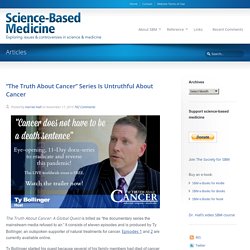
It consists of eleven episodes and is produced by Ty Bollinger, an outspoken supporter of natural treatments for cancer. Episodes 1 and 2 are currently available online. Ty Bollinger started his quest because several of his family members had died of cancer despite conventional cancer treatment. Meditation: Letting Life Be As It Is - Tara Brach. Mindfulness has huge health potential – but McMindfulness is no panacea. Mindfulness is rapidly becoming a global phenomenon, supported by increasingly rigorous scientific research, and driven in part by a longing for new practices that might help us to better apprehend and solve the challenges that threaten our health.

This week a landmark British report will lay out recommendations for the provision of mindfulness across many public policy areas. Mindful Nation UK, based on evidence presented to an all-party group of the UK parliament, carries enormous promise for health policy in Britain and the wider world. The World Health Organisation has warned that mental ill-health will be the biggest burden of disease in developed countries by 2030. We urgently need new approaches to tackling this epidemic, and crucially more research to determine the efficacy of mindfulness as a prevention strategy. Already, mindfulness training has been shown to reduce the risk of relapse of recurrent depression by one third. Divorcing a Narcissist. Talking Buddha, Talking Christ. Popemania may have moved on to the afterlife, but our memories of it endure: the wide-eyed references to Francis as a "rockstar," the jet-black Fiat, and yes, even the Popemojis.
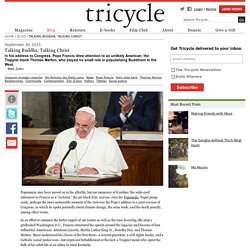
Papal pomp aside, perhaps the most memorable moment of the visit was the Pope's address to a joint session of Congress, in which he spoke pointedly about climate change, the arms trade, and the death penalty, among other issues. In an effort to summon the better angels of our nature as well as the ones hovering idly atop a gridlocked Washington D.C., Francis structured the speech around the legacies and lessons of four influential Americans: Abraham Lincoln, Martin Luther King Jr., Dorothy Day, and Thomas Merton. Many understood his choice of the first three—a revered president, a civil rights leader, and a Catholic social justice icon—but expressed befuddlement at the last: a Trappist monk who spent the bulk of his adult life at an abbey in rural Kentucky.
15 Life Changing Lessons To Learn From Rumi. 15 Life Changing Lessons To Learn From Rumi “Let yourself be silently drawn by the strange pull of what you really love.
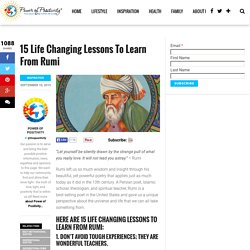
It will not lead you astray.” – Rumi. How Your Brain Is Wired Reveals the Real You. The brain’s wiring patterns can shed light on a person’s positive and negative traits, researchers report in Nature Neuroscience.
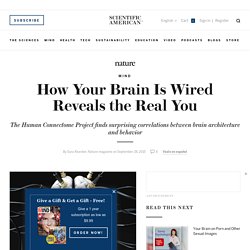
The finding, published on September 28, is the first from the Human Connectome Project (HCP), an international effort to map active connections between neurons in different parts of the brain. The HCP, which launched in 2010 at a cost of US$40 million, seeks to scan the brain networks, or connectomes, of 1,200 adults. Among its goals is to chart the networks that are active when the brain is idle; these are thought to keep the different parts of the brain connected in case they need to perform a task. How the Thrill Can Last a Lifetime. You are sitting on your meditation cushion, at one with your breath. You feel good—mindfulness is working! Right here right now there is nothing more interesting than this very moment. Suddenly you hear a voice you know so well, asking for the hundredth time “Honey, have you seen my keys?” You now spend your time wondering was this man, who counts picking up the car from the mechanic as a date, this woman, who forgets to feed the cat but knows the plot of every reality TV show, really once the most fascinating person in the world?
If you’re bored with your spouse, I am here to tell you that attention and curiosity don’t just belong on your cushion. Evangelical Pastor Gives Profound Response To Bernie Sanders’ Speech At Liberty U. Bernie Sanders gave a speech recently, regarding topics like economic inequality, healthcare reform, mass incarceration and providing more opportunity and earning potential for the poor, at Liberty University. The college, founded by televangelist Jerry Falwell, is the largest Evangelical College in the world. Generally speaking, it has been a Republican indoctrination school for most of its existence. The crowd went wild when the implication of banning abortion was brought up by an interviewer, as if this was the only social ill that plagued society. However, at least one person, a very conservative Evangelical pastor that worked on the Bush-Cheney campaign, is now comparing Bernie Sanders to John the Baptist.
9 Ways to Serve through Communication, by Birju Pandya. As I continue along the path of giving, I’m learning of the constant opportunity to act from a space of service. A recent personal insight in this space is how communicating with an intention to serve leads to markedly different behaviors. Some examples below: Talking + Share only to the extent that its genuinely other-centric (not to bolster one's own ego). + Sharing from a perspective of ‘bridge building’ to ensure that person-to-person connection, along with authentic adherence to one’s values, is of utmost importance (e.g., ‘proving’ that one is right is useless if you lose the connection along the way)
Sit Like a Mountain: An Image of Equanimity. Buddhist Monks Militarize in South and Southeast Asia. Richie Davidson: Well-Being is a Skill. We normally don’t think of well-being as a skill, says neuroscientist and emotion specialist Richie Davidson, founder of the Center for Investigating Healthy Minds at the University of Wisconsin-Madison. At a recent conference hosted by The Mind and Life Institute, Davidson talked about his center’s work in the field of contemplative neuroscience. He says one of the most important insights this work is leading us to is: we can train for well-being. “It is the neuroscientific evidence particularly which shows us that the circuits in the brain that are important to underlying well-being exhibit plasticity—it changes as a consequence of experience and as a consequence of training. When Parenting Gets Tough. Four Lessons from “Inside Out” to Discuss With Kids. The Neurobiology of Grace Under Pressure. Does "Inside Out" Get Sadness Wrong? - Mindful.
In the film “Inside Out,” an 11-year-old girl named Riley grapples with a major life event: moving from Minnesota to San Francisco, leaving friends and her home behind. The Heart Sūtra Mantra by Deva Premal. No Drama Discipline Mindfulness, Meditation, Wellness and Their Connection to Corporate America's Bottom Line. Fight or Flight. 10 Reasons Buddhism works for non-religious people. Painting by Michael Newhall.
Welcome to Forbes. Scientists Probe Puppy Love. The independent mindfulness information website - Mindfulness at Work. The Scientific Research on Workplace Mindfulness - MindWork. The independent mindfulness information website - Neuroscience of mindfulness. What Does Mindfulness Meditation Do to Your Brain? Compassion meditation reduces 'mind-wandering,' Stanford research shows. Felt in Its Fullness. The Four Qualities of Love, by Thich Nhat Hanh. Up in Smoke: A Buddhist pot-smoker on quitting weed. Reactive Attachment Disorder. This woman just explained consent with the most perfect metaphor : The Loop.
The Spectrum of Neglect: Four Types of Unresponsive Care. How Early Experiences Alter Gene Expression and Shape Development. Arguing parents could damage their baby for life, study claims. Thich Nhat Hanh on Loosening the Knots of Anger. Meditation booms as people seek a way to slow down. Research Roundup from Mindful magazine. Database Error. Mindfulness Meditation Can Help You Fall (And Stay) Asleep. Meditation booms as people seek a way to slow down. This Valentine’s Day Forget Chocolate–Practice Mindful Sex. Uk.businessinsider. Welcome to Forbes. Welcome to Forbes. What's Sex Got To Do With It? Forever young: Meditation might slow the age-related loss of gray matter in t... World-first evidence suggests that meditation alters cancer survivors’ cells. Changing Our DNA through Mind Control? UK on the Fast Track to Becoming a Mindful Nation.
The Game Changer. Scientific Benefits of Meditation - 76 things you might be missing out. 2014: The Year of Mindfulness, Religion of the Rich. How an On-Air Panic Attack Led Thousands of People to Meditation. Court program uses mindfulness. Time's Up for 'Timeout' Wisdom 2.0 2014: Google Handles Protesters with... Bill Duane. 3 Reasons Everyone At Google Is Meditating. Ness is Taking Root—Help it Grow. Mindful.org - A study finds meditating cancer patients are... Can meditation treat anxiety better than medication? - Health & wellness. Ness is Taking Root—Help it Grow.
24 Human Character Strengths and Core Virtues. What Does Mindfulness Mean To You? Eight weeks to a better brain. Forget Positive Thinking – Try This to Curb Teen Anxiety. The Neuroscience of Suffering – And Its End. Neuroscience Reveals the Secrets of Meditation’s Benefits. Neuroscience Reveals the Secrets of Meditation’s Benefits. Meditation Covers Scientific American November 2014 Issue. From decisions to disorders: how neuroscience is changing what we know about ourselves. New York Knicks Must Embrace Phil Jackson’s ‘Mindfulness Training’ ScienceDaily - Fighting parents hurt children's ability to recognize and regulate emotions.
How stress and depression can shrink the brain. How stress tears us apart: Enzyme attacks synaptic molecule, leading to cognitive impairment. Why Mindfulness Matters: Lessons from the Seattle Seahawk’s Sports Psychologist (pt 1) Is Mindfulness Good Medicine? Congressman Moonbeam. Researchers Finally Show How Mindfulness and Thoughts Can Induce Specific Molecular Changes To Your Genes. Mindfulness and meditation training could ease PTSD symptoms, researchers say. There's A New, All-Party Parliamentary Group on Mindfulness in the UK. When Memory is Under Attack. Why Do "Strivers" Meditate? The New Yorker Finds Clues in Dan Harris' "10% Happier" Can meditation really slow aging? The Science of Mindfulness. What Changes and What Doesn't: An interview with Dzongsar Khyentse Rinpoche. What Neuroscience Can Teach Us About Compassion. Daily Meditation: Promises.